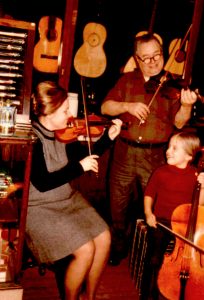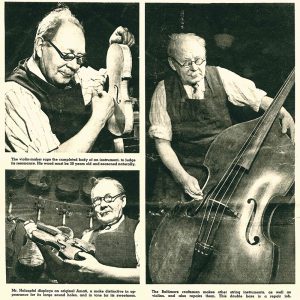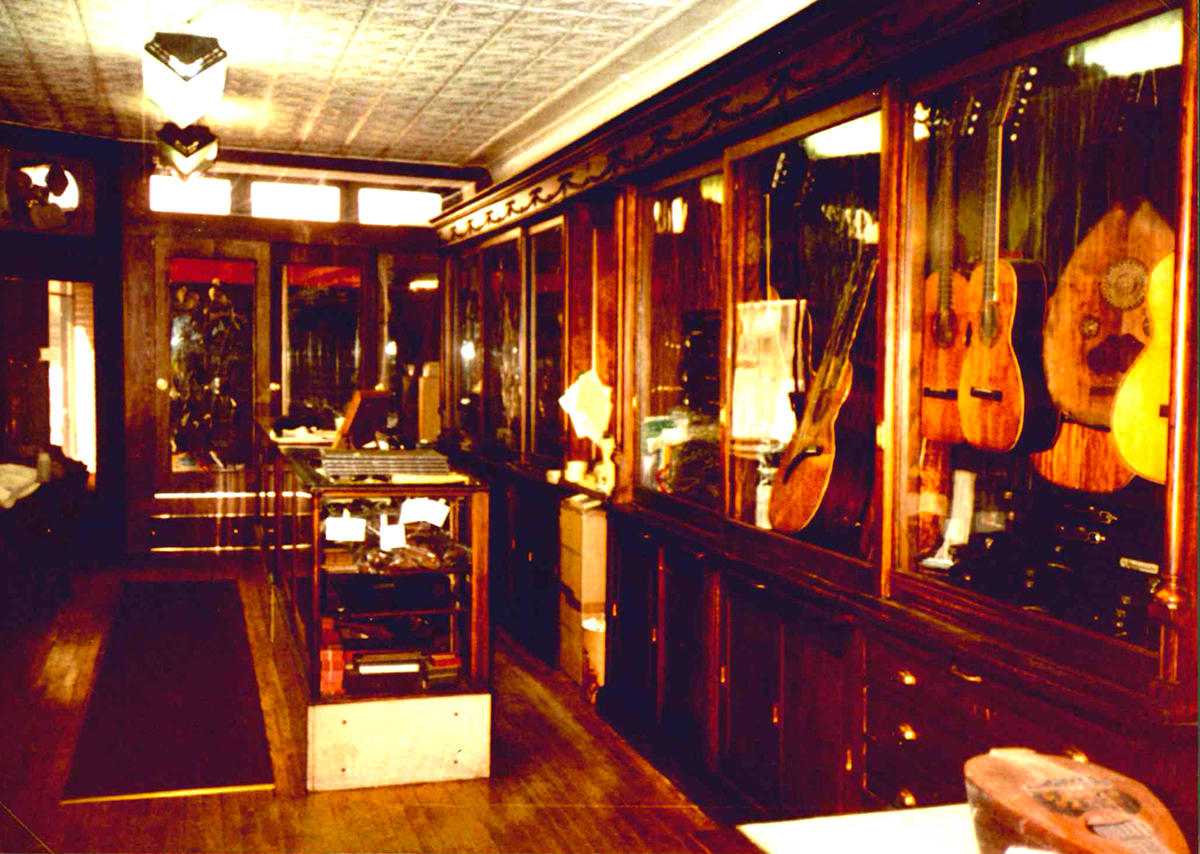The air hung heavy with the smell of wood shavings, varnish and dust. The hammered-tin ceiling shone high overhead, while glass-fronted cases lined the walls, filled with violins, violas, guitars and mandolins.
Every day, the lights flickered on, the phone rang, and customers arrived with their instrument cases in hand to buy new strings or bring a violin in need of repair. My grandfather would assume his usual seat at his workbench, ready to remove the back of a damaged violin and begin the delicate work of restoring it. Next to him, my eight-year-old hands worked busily with tools, wood pieces, glue and paint.
So began a typical day of my childhood, much of it spent at the Holzapfel Violin Shop. Founded in 1898 by my great-grandfather, Carl C. Holzapfel, a German immigrant who learned the fine art of instrument making as an apprentice in a luthier school in Europe, the music shop at 222 West Fayette Street in Baltimore centered my family for generations. In this special place, I learned a great deal about music, love and the meaning of family.
 My grandfather, Carl M. Holzapfel, took over the shop when his father passed away. Grandpa was my hero, a man of fascinating contrasts and tremendous talent. He had strong, massive hands roughened by years of work, yet tender and gentle enough to hew the inside of priceless instruments. And a quick German temper with strangers, yet the patience of a saint when he taught me to play violin.
My grandfather, Carl M. Holzapfel, took over the shop when his father passed away. Grandpa was my hero, a man of fascinating contrasts and tremendous talent. He had strong, massive hands roughened by years of work, yet tender and gentle enough to hew the inside of priceless instruments. And a quick German temper with strangers, yet the patience of a saint when he taught me to play violin.
He was an amazing musician, a principal violist of the National Symphony Orchestra and a first violinist in the Baltimore Symphony. But he was even more amazing as a teacher, my first one, from the age of 2. Grandpa always cheered me on, was always eager to help me learn. I remember the day I finally mastered a bowing technique that we had worked on together for months. He literally did a jig, dancing his rather ponderous figure around the back of the violin shop as I successfully navigated the tricky bowing he had coached me on again and again.
For my sixteenth birthday, my gift from him was perhaps the most meaningful object I’ve ever received: his violin, made by my great-grandfather. It was the gold medal-winning violin at a 1926 international instrument competition where runners-up included Stradivarius and Guarnerius violins. Many a concert has been played on that beloved violin, many of which he heard. If he couldn’t be in the audience, I always made a point to call Baltimore and tell him all about the music I played. The violin bonded us together.
It was my plan to take over the family violin shop, but at sixteen, Grandpa sat me down and told me unequivocally that I would not be allowed to follow his path.
“Music is a hard life, Pilar, hard on your family — so much time away. If you can do anything else except music, do it.”
He was aware that I loved science and math, and was proud of me for pursuing a career in the other thing that I have always loved — caring for children.
 Following his tragic and unexpected death from septic shock during my sophomore year in college, the violin shop was bought by a swindler, who promised my grieving grandmother he would run the shop with her. Instead, he closed the shop and sold or discarded all of the instruments and tools along with countless other meaningful remnants from generations of our family.
Following his tragic and unexpected death from septic shock during my sophomore year in college, the violin shop was bought by a swindler, who promised my grieving grandmother he would run the shop with her. Instead, he closed the shop and sold or discarded all of the instruments and tools along with countless other meaningful remnants from generations of our family.
Gladly, we were able to save a handful of Great-grandpa’s tools, which we gave, along with a scholarship endowed in his name, to the Peabody Conservatory of Music in Baltimore. Most importantly to me, I have several instruments made by my great-grandfather and played by my granddad, each one a beautiful testimony to the enduring nature of musical instruments as artworks unto themselves.
From Grandpa’s teaching I learned much more than how to play violin. I learned that being good at something takes patience, repetition and consistent effort. I saw that the reward for hard work is the confidence that you gain from rising to a challenge. And I saw that being passionately dedicated to your craft means so much more when it is shared with a loved one. For all these reasons, I have worked hard to teach music to my own two children. I am quite sure that when they play music, Grandpa and Great-grandpa are watching.

